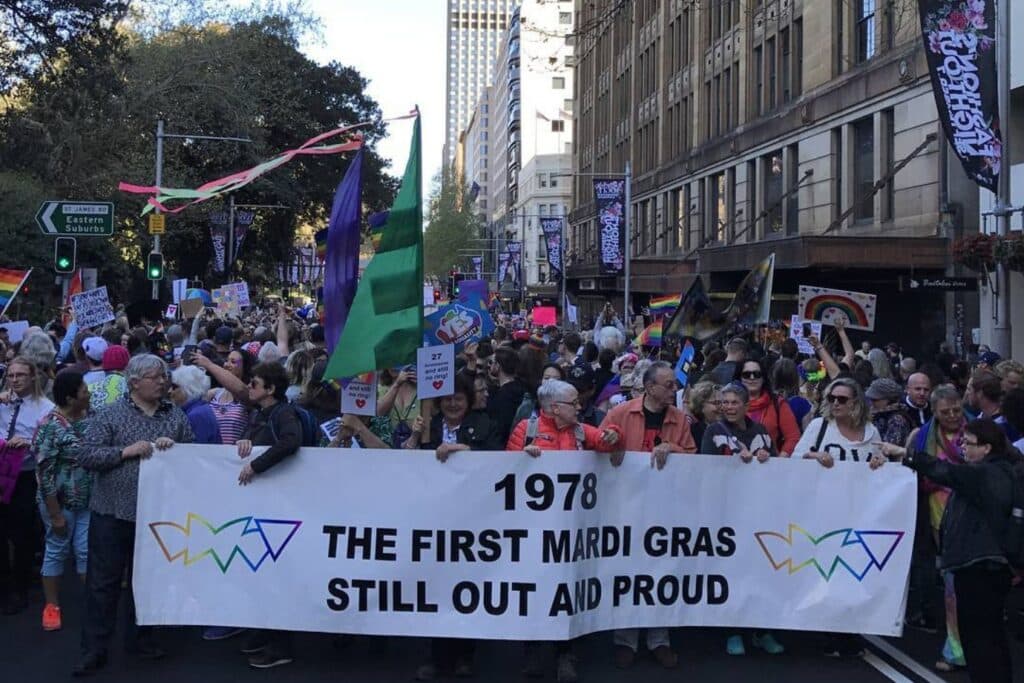The leaders of the NSW Labor government will be issuing an official apology in parliament today to those who were arrested and jailed under the state’s historic homosexuality laws.
It is the last state government to give an official apology in Australia, and it comes just two days shy of the 40th anniversary of NSW’s decriminalisation of homosexual acts in 1984.
Premier of NSW Chris Minns will deliver his apology to the Legislative Assembly at 12:15pm today, while Leader of the Labor party in the Legislative Council, Minister Penny Sharpe, will give a similar apology later this afternoon in the upper house.
Premier Chris Minns said he hopes the formal apology will bring “some semblance of closure” for the LGBTQIA+ community, who were impacted by the historic laws and continue to feel ongoing discrimination.
“I know that to many this apology will not remedy discrimination of the past, but I hope that it brings some semblance of closure to those that were unfairly targeted by laws of the day that criminalised gay and lesbian people for being who they are,” the Premier said.
Minister Penny Sharpe is the first gay woman to serve in the NSW parliament and is the state’s first gay woman to hold a ministerial portfolio. She said this is a chance to appreciate the change makers who fought hard for LGBTQIA+ rights.
“A formal state apology to those who suffered at the hands of laws that criminalised homosexuality recognises the harm done to many and acknowledges that it was wrong,” Minister Sharpe said.
“It is also an opportunity to thank those who fought for change.”
The 78ers: ‘It’s a big relief.’
Dozens of people who attended Sydney’s very first Mardi Gras in 1978 – now known as the 78ers – will attend Parliament House today to hear both official apologies from the government. At least 53 people were arrested at the first Mardi Gras in Sydney, which sparked four other protests in the same year for LGTBQIA+ rights.
Diane Minnis, the co-chair of the organisation First Mardi Gras, will join other 78ers to attend the apology at NSW Parliament House today. She said the move from the government is a significant one, especially so close to the 40th anniversary of decriminalisation.
“We applaud the government for listening to our community. It’s a big relief,” Minnis told Women’s Agenda.
“Standing up and saying something about past wrongs makes a difference to people in the community who are fighting homophobia now, and hopefully starts to impact the mindset of those who are homophobic.”
Prior to decriminalisation, NSW’s anti-gay laws meant men who had homosexual sex could face up to 14 years in prison. This is compared to the penalty for rape at the time, which was just seven years.
“We think it’s important to recognise the harm that was done to gay men with these laws,” Minnis said.
The history and impact of anti-gay laws
NSW decriminalised homosexuality in 1984 under the late Labor Premier Neville Wran. His wife, Jill Wran, will also attend Parliament House today to witness the apologies in the lower and upper houses.
NSW was the fifth state to abolish laws that criminalised homosexuality. The first was South Australia ten years prior in 1974, meanwhile it wasn’t until 1997 that Tasmania decriminalised homosexuality, the last state to do so.
Victoria and South Australia were the first states to formally apologise to the LGBTQIA+ community for its homophobic laws in 2016, followed by Queensland, Western Australia and Tasmania in 2017. NSW is the last state to issue a formal apology.
Discrimination against LGBTQIA+ people has had ongoing effects on the community’s health and wellbeing. According to data from the Australian Bureau of Statistics released earlier this year, non-binary Australians are experiencing mental health issues at more than double the rate of men and women. Three in four lesbian, gay, bisexual or otherwise non-heterosexual Australians have experienced a mental illness at some point in their lives.
While lesbian sex was never criminalised in legislation, gay women in the 1970s faced just as much discrimination as gay men. In fact, Minnis from First Mardi Gras Inc. said more women were subjected to psychosurgery (lobotomies) for being gay than men.
This type of discrimination has had a significant impact on queer women today. A study from Harvard in the United States found lesbian and bisexual women are more likely to die earlier than straight women. Compared to those who identified as heterosexual, those who identified as lesbian or bisexual died 26 per cent sooner, with lesbian women died 20 per cent sooner and bisexual women dying 37 per cent sooner.


